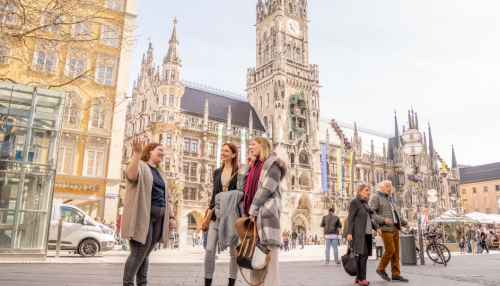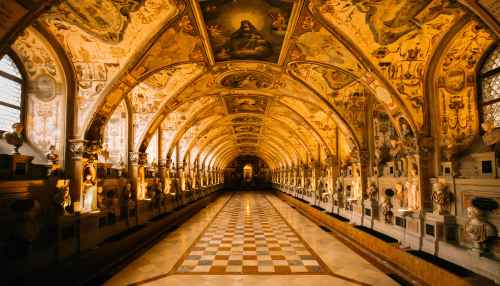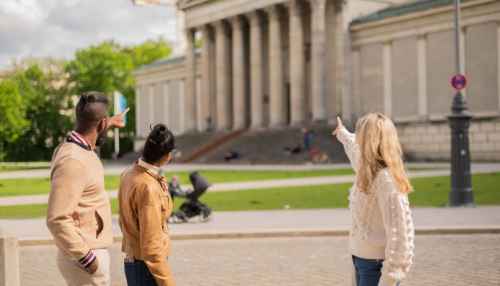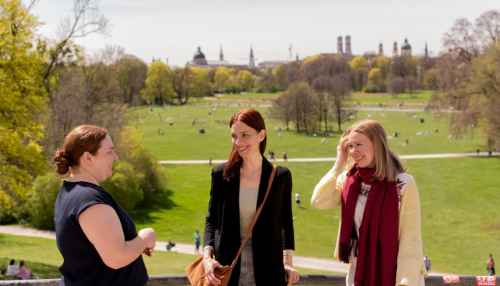Table Of Contents
- What Makes Munich's Winter Weather Worth Embracing?
- Are Munich's Christmas Markets Really That Special?
- How Do You Really Experience Munich's Beer Culture in Winter?
- Where Can You Find the Best Ice Skating in Munich?
- What Should You Know About Day Trips to Neuschwanstein Castle?
- How Does Munich's City Center Transform in Winter?
- What Makes Peter's Church Worth Climbing in Winter?
- How Do You Navigate Munich's Museum Scene in Winter?
- Where Can You Find Authentic Winter Swimming and Wellness?
- What Are the Best Winter Food Experiences Beyond Beer Halls?
- How Do You Plan Transportation and Logistics for Winter Munich?
- What Winter Activities Work Best for Different Types of Travelers?
- Can You Experience Munich Like a Local During Winter?
- What Should You Pack and Expect for Munich in Winter?
- FAQs about Munich in Winter
![IMAGE: Snow-covered Marienplatz with festive lights and a glowing Christmas tree at twilight. Filename: marienplatz-winter-evening.jpg]
When I tell people about the things to do in Munich in winter, they usually picture Christmas markets and maybe some cold beer. But living here for years, I've discovered that Munich in winter transforms into something far more magical than most visitors expect, like stepping inside a Christmas snow globe where every corner reveals another cozy surprise.
The truth is, Munich in the winter has this unique ability to make you slow down and savor moments. Whether you're warming up with mulled wine at a medieval market or taking a spontaneous day trip to a snow-dusted castle, the season here has a rhythm that even we locals fall in love with year after year. When you visit Munich in December and January, the city becomes this intimate version of itself, where the usual tourist crowds thin out and you get to experience Germany's most charming Bavarian city authentically and without the rush.
What Makes Munich's Winter Weather Worth Embracing?
Let's be honest about winter weather in Munich; it's cold, sometimes gray, and yes, you'll need proper layers. The average temperature hovers around freezing, with January being the coldest month. But here's what guidebooks don't tell you: this weather creates the perfect backdrop for all those cozy experiences that make Munich special.
![IMAGE: Locals bundled in scarves walking through snowy Viktualienmarkt. Filename: winter-market-morning.jpg]
I've learned to embrace the cold days because they give you legitimate reasons to duck into a beer hall, linger over warm mulled wine, or spend an entire afternoon in a museum. The winter wonderland atmosphere isn't just about aesthetics, it shapes how you move through the city and what you prioritize.
Most visitors worry about speaking German, but generally speaking, you'll find English works fine, especially in tourist areas around the city center and main train station. The colder months actually make it easier to connect with locals since everyone's huddled together in warm spaces, sharing the seasonal experience. This detailed guide approach to experiencing Germany's Bavaria region means accepting that weather becomes part of the adventure.
Are Munich's Christmas Markets Really That Special?
Every December, people ask me about the best Christmas markets in Munich, and I always start with this: yes, they're genuinely special, but not for the reasons you might expect. The Christmas markets here aren't just tourist attractions—they're how locals mark the season too.
The Christkindlmarkt at Marienplatz gets most of the attention, and rightfully so. But what I love about Munich's approach is how each market has its own personality. The Christmas market foods range from traditional roasted almonds to modern twists on Bavarian food. You'll find everything from traditional Bavarian food like lebkuchen to international vendors selling curries, halloumi or spiced stews.
![IMAGE: Steam rising from mulled wine cups at a crowded Christmas market stall. Filename: mulled-wine-evening.jpg]
The Christmas lights throughout the old town create this warm glow that makes even the shortest December days feel magical. And here's a local tip: the Christmas tram that runs special holiday routes gives you a completely different perspective on how the city transforms during this season.
What makes these markets genuinely authentic is how they blend tourist experience with local tradition. During special events, you might even spot locals in elaborate costumes celebrating traditional Bavarian holidays, these are genuine cultural expressions that happen to coincide with market season.
Looking for a private city experience in Munich?
Explore the city with a local who plans a private day just for you; no groups, no scripts.
How Do You Really Experience Munich's Beer Culture in Winter?
German beer culture doesn't hibernate when temperatures drop, it just moves indoors and gets cozier. The famous beer hall experiences you've heard about become even more atmospheric when it's cold outside. But beyond Hofbräuhaus (which honestly feels pretty touristy year-round) the colder months are when you discover the neighborhood beer halls where locals tend to spend their evenings.
Beer hall culture transforms during cold weather into something naturally social. You're not sitting outside at individual tables. You're sharing long wooden benches inside, and conversations happen organically. The traditional Bavarian food hits differently when you've just walked through snow to get there.
![IMAGE: Interior of traditional beer hall with warm lighting and shared wooden tables. Filename: cozy-beer-hall-winter.jpg]
Rich gravy on schnitzels, hearty stews, pretzels bigger than your head; this is comfort food designed for this weather. And yes, the beer tastes better when it's cold outside. Something about the contrast makes every sip more satisfying.
For those wanting more tips about authentic experiences, these neighborhood halls are often just a stone's throw away from major tourist attractions, but feel worlds away from the crowds. Guided tours typically skip these local favorites, which means discovering them becomes part of your Munich experience.
For those wondering about Bavarian food beyond the tourist staples, the colder months are actually when restaurants bring out their most traditional dishes. Root vegetables, warming spices, dishes that have been keeping Bavarians satisfied through cold seasons for centuries. My top tips for authentic dining include seeking out family-run establishments where recipes haven't changed in generations.
Where Can You Find the Best Ice Skating in Munich?
Ice skating in Munich offers options beyond the typical tourist rinks. The outdoor rink at Marienplatz gets crowded, but it's undeniably charming with the Christmas lights and medieval architecture surrounding you. However, locals know that the rink near Nymphenburg Palace provides a more spacious experience with equally beautiful surroundings.
The English Garden sometimes offers natural ice skating when the weather cooperates, though you need to check conditions carefully. What I love about skating here is how it connects to the city's geography, you're not just exercising, you're experiencing Munich's in the winter, embracing the landscape.
![IMAGE: Families ice skating with Munich's historic buildings in the background. Filename: ice-skating-marienplatz.jpg]
For those traveling with children, the indoor options near the Olympic Tower provide reliable conditions regardless of weather. The skating rink facilities are well-maintained, and you can easily combine this with other activities in the museum quarter.
Ice skating here isn't just a cold-weather activity, it's a way to see familiar spaces transformed. The same squares and parks you might visit in summer take on completely different characters when they're hosting skating or covered in snow.
What Should You Know About Day Trips to Neuschwanstein Castle?
A day trip to Neuschwanstein Castle becomes dramatically different during the cold months, and honestly, more magical. Yes, Neuschwanstein Castle is open when temperatures drop, though with reduced hours and weather-dependent closures. The journey from Munich takes about two hours by train and bus, but the snow-covered Bavarian Alps make every minute of travel worthwhile.
What most people don't realize is that cold weather transforms the castle from a busy tourist destination into something closer to the fairy tale it was designed to evoke. The crowds are smaller, the surrounding forest looks like Cinderella's castle setting, and the contrast between the warm interior and snowy exterior is striking.
![IMAGE: Neuschwanstein Castle surrounded by snow-covered trees and mountains. Filename: neuschwanstein-winter-snow.jpg]
The logistics matter here: dress warmly, check weather conditions before leaving, and buy your tickets in advance even during the off-season. The train station connections from Munich work reliably, but cold weather can affect the final bus connection to the castle.
For those considering this day trip, plan for the full day experience. The journey becomes part of the adventure when you're watching the countryside transform from city to forest to mountain landscape, all covered in snow. Many guided tours offer this route, but independent travel gives you flexibility to adjust timing based on weather conditions.
What if your day in Munich was planned by someone who knows it — and you?
City Unscripted matches you with a local host who creates a private experience based on your interests, not a set route.
How Does Munich's City Center Transform in Winter?
The historical center of Munich becomes more intimate when temperatures drop. The same city center that feels expansive in summer draws inward, with warm light spilling from shop windows and cafes becoming refuges rather than just stopping points.
Marienplatz remains the heart of winter activity, but it's the side streets and smaller squares that really show you how locals experience the season. The old town takes on this cocoon-like quality where every turn offers either shelter or something beautiful to look at.
Walking from the main train station toward the center, you'll notice how the architecture frames the cold months differently. The Gothic spires and baroque facades that define Munich's skyline create dramatic silhouettes against gray skies, and when snow does fall, the contrast is spectacular.
![IMAGE: Munich's pedestrian zone with winter decorations and warm café lights. Filename: city-center-winter-glow.jpg]
Living here has taught me that the winter reveals the city center's true scale. Without the summer crowds and outdoor seating, you notice details you might otherwise miss, the carved stonework, the way light reflects off cobblestones, the sound of your footsteps echoing differently in cold air.
The public transport system keeps everything connected efficiently, so you're never more than a few minutes from somewhere warm. The U-Bahn stations themselves become gathering points where people shake off snow and prepare for the next part of their journey.
What Makes Peter's Church Worth Climbing in Winter?
Peter's Church offers one of Munich's best cold-season experiences, though it requires some effort. The climb up 299 steps feels more challenging in heavy clothing, but the view from the top showcases Munich in a way that's impossible to appreciate from ground level.
From the tower, you can see how the city spreads out beneath gray skies, with the Bavarian Alps visible on clear days creating a dramatic backdrop. The Christmas markets below look like miniature villages, and you gain perspective on how Munich's old town fits into the larger urban landscape.
![IMAGE: Panoramic view of snow-dusted Munich rooftops from Peter's Church tower. Filename: peters-church-winter-view.jpg]
The church itself, officially called Peterskirche, represents Munich's oldest parish church, and when it's cold outside, the interior provides both historical context and physical warmth. The Gothic architecture feels more dramatic when you've just come in from frigid weather.
How Do You Navigate Munich's Museum Scene in Winter?
The cold months are actually peak season for Munich's museum culture, and the museum quarter becomes a natural destination when outdoor activities lose their appeal. The Deutsches Museum offers enough content to fill multiple days, with interactive exhibits.
Museum-hopping in Munich during the winter creates natural rhythms. You can spend morning hours in a gallery, break for a hot lunch, then continue exploring without feeling rushed by weather or closing times that come too early.
The Olympic Tower combines museum experience with spectacular views, and during cold months, the observation deck provides unobstructed views of snow-covered Munich and the Alps beyond. On clear days, this vantage point is unmatched.
![IMAGE: Visitors exploring interactive exhibits in the Deutsches Museum. Filename: museum-winter-activities.jpg]
Cold weather can affect transportation and scheduling. But the beauty of Munich's museum scene is its concentration, most major institutions are located close to each other and accessible via public transport.
For those creating a Munich itinerary around indoor activities, the museum quarter allows you to move efficiently between different types of experiences while staying warm and engaged.
Tip
We match you with the right host, not just any guide.Want to experience the real Munich with someone who lives there?
A fully private experience, planned and led by a local host who tailors the day to you
Where Can You Find Authentic Winter Swimming and Wellness?
This might surprise visitors, but Munich has a strong cold-weather swimming culture, and several locations offer swimming pool facilities that embrace rather than ignore the season. There are outdoor pools that stay open year-round.
Near the English Garden, you'll sometimes see locals participating in cold-water swimming in the River Isar, though this requires experience and proper preparation. For visitors, the heated outdoor pools provide a gentler introduction to how locals stay active during cold months.
The Chinese Tower becomes a different place when temperatures drop. It's a busy beer garden in summer, but transforms into a quiet walking area where you can experience Munich's largest park without crowds, and when snow covers the paths, it feels like discovering a secret part of the city.
![IMAGE: Steaming outdoor pool with snow-covered trees surrounding it. Filename: winter-swimming-bavaria.jpg]
These wellness experiences connect authentically to Munich's overall approach to the winter, embracing rather than merely enduring it. The contrast between warm water and cold air, or heated saunas and snowy surroundings, becomes part of the experience rather than something to overcome.
What Are the Best Winter Food Experiences Beyond Beer Halls?
Munich has incredible winter food experiences. The seasonal markets and small restaurants throughout the city center serve dishes specifically designed for cold weather; soups, stews, and warming drinks that locals rely on throughout the colder months.
Food at the Christmas markets represent just one part of Munich's seasonal culinary scene. Throughout the cold months, restaurants feature game meats, root vegetables, and warming spices that reflect both Bavarian tradition and seasonal availability. The traditional Bavarian food scene becomes more concentrated and authentic when it's designed for locals dealing with frigid weather.
Cold weather brings out Munich's neighborhood restaurant culture. Places that might feel too heavy or rustic in summer become perfect when you need substantial, hot food after walking through cold streets.
![IMAGE: Traditional Bavarian winter stew with crusty bread and warm lighting. Filename: winter-bavarian-cuisine.jpg]
For those seeking best tips about cold-season dining, consider that meal timing shifts when temperatures drop. Lunch becomes more important when daylight is limited, and dinner often starts earlier than summer schedules might suggest.
Christmas time offers special menus and seasonal drinks at restaurants throughout Munich, not just at markets. Mulled wine variations appear on restaurant menus, and many places offer warming digestifs and seasonal cocktails designed for cold weather.
How Do You Plan Transportation and Logistics for Winter Munich?
Public transport in Munich works efficiently year-round, but winter requires some additional planning. The U-Bahn system provides reliable connections regardless of weather, but surface transportation can be affected by snow or ice.
For those staying near the main train station, most of Munich's winter attractions remain easily accessible. The tram ride to various Christmas markets becomes part of the experience rather than just transportation, especially when trams are decorated for the season.
Buy tickets in advance for popular winter attractions like Neuschwanstein Castle or special holiday events. Winter crowds are different from summer ones, smaller but more concentrated around specific experiences.
![IMAGE: Snow-covered tram stop with passengers waiting in winter coats. Filename: winter-public-transport.jpg]
Travel tips for Munich in winter include carrying a small umbrella (for snow as much as rain), wearing layers you can adjust indoors, and allowing extra time for transportation during busy periods like Christmas markets.
The German-Austrian border becomes relevant if you're planning day trips south to ski areas or additional castles. Winter weather can affect crossing times, but the journey through snow-covered landscape makes delays feel less frustrating.
Ready to plan your perfect day in Munich?
Start your experienceWhat Winter Activities Work Best for Different Types of Travelers?
Often visitors to Munich in winter fall into patterns based on their interests and energy levels. Families often focus on Christmas markets and indoor attractions like museums, while solo travelers might prioritize Bierhalle experiences and walking tours that work regardless of weather.
For those interested in cross country skiing, the areas around Munich offer opportunities within day-trip distance (though you'll need to rent equipment and check snow conditions). The Alps provide more reliable snow than the immediate Munich area.
Fun things to do in Munich during winter often depend on embracing spontaneity. Weather changes can redirect plans, but this often leads to discovering experiences you hadn't considered, like spending an unexpected afternoon in a warm cafe or stumbling onto a neighborhood Christmas market.
![IMAGE: Families enjoying winter activities in Munich's English Garden. Filename: winter-family-activities.jpg]
So many fun things emerge from Munich's winter culture that planning too rigidly can cause you to miss authentic moments. The balance between having a framework and staying flexible becomes especially important when weather affects transportation and outdoor activities.
Generally speaking, winter visitors who embrace Munich's indoor culture and seasonal rhythms have better experiences than those trying to maintain summer-style itineraries.
Can You Experience Munich Like a Local During Winter?
Munich's version of winter authenticity involves accepting that some days are meant for staying indoors, some weather is meant for warming up with drinks, and some experiences only happen when it's cold outside.
Good children and bad children both get special attention during Munich's winter season, the traditional Christmas celebrations include folklore about St. Nicholas that shapes how locals experience the holidays. Understanding these cultural elements helps visitors connect with why certain traditions matter here.
Living in Munich has taught me that winter reveals the city's true personality. Summer Munich is welcoming and expansive, but winter Munich is intimate and genuine. You get to see how locals live, what they prioritize when weather limits options, and how community forms around shared experiences of navigating the season.
![IMAGE: Locals and visitors sharing a table at a traditional Munich beer hall. Filename: authentic-winter-social.jpg]
The Chinese Tower beer garden might be closed, but the surrounding Englischer Garten becomes a different kind of community space where locals walk dogs, cross-country ski, and experience their city without tourist infrastructure.
Year round, Munich maintains its character, but winter strips away some of the performance aspects of tourist season and shows you the city that locals actually inhabit.
What Should You Pack and Expect for Munich in Winter?
What should I pack for winter in Munich? Pack layers rather than just heavy coats—you'll move between cold streets and very warm indoor spaces. Waterproof shoes, a warm scarf, gloves, and an umbrella for snow are essential. Avoid overpacking heavy items since you can purchase winter gear locally if needed.
Travel insurance considerations for winter travel include coverage for weather-related delays or cancellations, especially if you're planning day trips to areas that might be affected by snow or ice conditions.
![IMAGE: Well-dressed locals walking through snowy Munich streets. Filename: winter-fashion-munich.jpg]
Flight deals to Munich in winter can be excellent, as this is considered off-season despite Munich having the best Christmas markets. January and February offer particularly good value (you'll miss the Christmas markets) but gain a more authentic local experience.
Temperature expectations should include variability, some winter days reach above freezing and feel quite pleasant, while others drop well below and require serious layering. The key is adaptability rather than planning for one specific condition.
FAQs about Munich in Winter
What is the average temperature in Munich in winter? Winter temperatures in Munich typically range from -2°C to 4°C (28°F to 39°F), with January being the coldest month. Expect occasional snow and frequent gray skies, but also surprisingly mild days that make walking enjoyable.
Are Munich's Christmas markets open in January? Most Christmas markets close on December 23rd or shortly after Christmas Day. However, some winter markets and the traditional Viktualienmarkt continue operating year-round with seasonal foods and warming drinks available throughout winter.
Is Neuschwanstein Castle open in winter? Yes, Neuschwanstein Castle operates in winter with reduced hours and weather-dependent closures. Winter visits offer smaller crowds and dramatic snowy landscapes, but require advance ticket purchases and weather-appropriate clothing for the outdoor portions.
Do I need to speak German to get around? No, English works fine for tourists, especially in central Munich, restaurants, and major attractions. Learning basic German phrases enhances the experience, but language shouldn't prevent you from enjoying Munich's winter offerings.
Munich in winter transforms into something more intimate and authentic than its summer tourist season. The things to do in Munich in winter extend far beyond Christmas markets into a world of cozy beer halls, snow-dusted castles, and genuine local experiences that show you how Bavarians actually embrace the cold season.
Whether you're planning a day trip to Neuschwanstein Castle or simply want to understand how locals navigate winter weather, Munich offers experiences that make the cold not just tolerable, but genuinely enjoyable. From warm mulled wine at medieval markets to discovering authentic Bavarian food in neighborhood restaurants, this season reveals Munich's true character.
The city becomes your winter wonderland, not because of tourist marketing, but because of how every element, from Christmas lights reflecting off cobblestones to steam rising from mulled wine, creates that Christmas snow globe feeling that makes the cold season in Munich genuinely magical.
For more seasonal experiences throughout the year, explore our Munich experiences or discover what the city offers during different seasons with our guide to things to do in Munich in March.
What if your day in Munich was planned by someone who knows it — and you?
City Unscripted matches you with a local host who creates a private experience based on your interests, not a set route.
Want to experience the real Munich with someone who lives there?
A fully private experience, planned and led by a local host who tailors the day to you
Meet Your Munich Hosts
A personalized way to explore Munich’s must-see landmarks beyond the tourist crowds.











